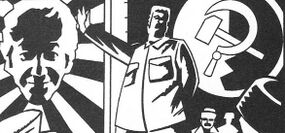Communism: Difference between revisions
No edit summary |
|||
| Line 1: | Line 1: | ||
{{wikipediainfo}} | {{wikipediainfo}} | ||
'''Communism''' was a human political movement, comparable to [[socialism]], [[anarchism]], [[republicanism]] and [[unionism]], and contrasted with [[nationalism]], [[fascism]], [[Carlism]] and [[Catholicism]]. ([[PROSE]]: ''[[History 101 (novel)|History 101]]'') | '''Communism''' was a human political movement, comparable to [[socialism]], [[anarchism]], [[republicanism]] and [[unionism]], and contrasted with [[nationalism]], [[fascism]], [[Carlism]] and [[Catholicism]]. ([[PROSE]]: ''[[History 101 (novel)|History 101]]'') | ||
Revision as of 19:50, 19 September 2023
Communism was a human political movement, comparable to socialism, anarchism, republicanism and unionism, and contrasted with nationalism, fascism, Carlism and Catholicism. (PROSE: History 101)
Das Kapital was a major communist work written by Karl Marx. (AUDIO: Brotherhood of the Daleks)
History
The Soviet Union was a communist state. (PROSE: History 101) Its symbol was the hammer and sickle. (COMIC: Target Practice)
In 1919, the Bolsheviks seized power in Uzbekistan. The Second Doctor, Jamie McCrimmon and Zoe Heriot visited the country shortly afterwards, in August of that year. (AUDIO: The Memory Cheats)
Communism filtered from the USSR into China prior to the outbreak of the Second Sino-Japanese War. Chiang Kai-shek's Nationalist Government successfully contained the communist movement in the mountains of north and central China. However, the family of Chiang's wife were communist sympathisers. (PROSE: The Shadow of Weng-Chiang)
In July 1936, the Spanish Civil War began when a group of conservative generals revolted against the democratic government out of fear that traditional Catholic values were being undermined and the government was leaning towards Communism. (AUDIO: Fiesta of the Damned)
By 1951, following World War II, the Communists had come to power in China. (PROSE: Endgame)
David Ritchie was a member of the Communist Party of Great Britain until the Soviet Union invaded Hungary in 1956. (AUDIO: 1963: The Assassination Games)
During the filming of the 1957 science fiction film Swamp of Horrors, Adrian Cooper accused the Sixth Doctor of being a "Commie beatnik". Cooper also claimed that all aliens were Communists. (PROSE: Swamp of Horrors (1957) - Viewing Notes)
In 1958, Colonel Stark claimed that the Tenth Doctor was a communist to justify killing him. (TV: Dreamland)
Norman Baker told the Third Doctor, Brigadier Alistair Gordon Lethbridge-Stewart, and Liz Shaw that he believed that communist saboteurs were behind the power losses at Wenley Moor, on the basis that "they hate[d] England", claiming that "they train people to come here to destroy us." (PROSE: Doctor Who and the Cave-Monsters)
In 1989, the Communist regimes in Poland, Hungary and Czechoslovakia were overthrown. In Czechoslovakia, it was known as the Velvet Revolution and took place on 28 November of that year. The Eleventh Doctor, Amy Pond and Rory Williams were present for the event, and stopped an invasion by the Mavora, with the help of the Golem of Prague. (COMIC: The Broken Man)
Charley Pollard accused Murgat of being "bolshie". (AUDIO: Brotherhood of the Daleks)
In 1997, the Brigadier confided to the Eighth Doctor that he had believed that Nelson Mandela was a communist terrorist. (PROSE: The Dying Days)
Behind the scenes
Malcolm Hulke and the father of Ben Aaronovitch were members of the Communist Party of Great Britain.

